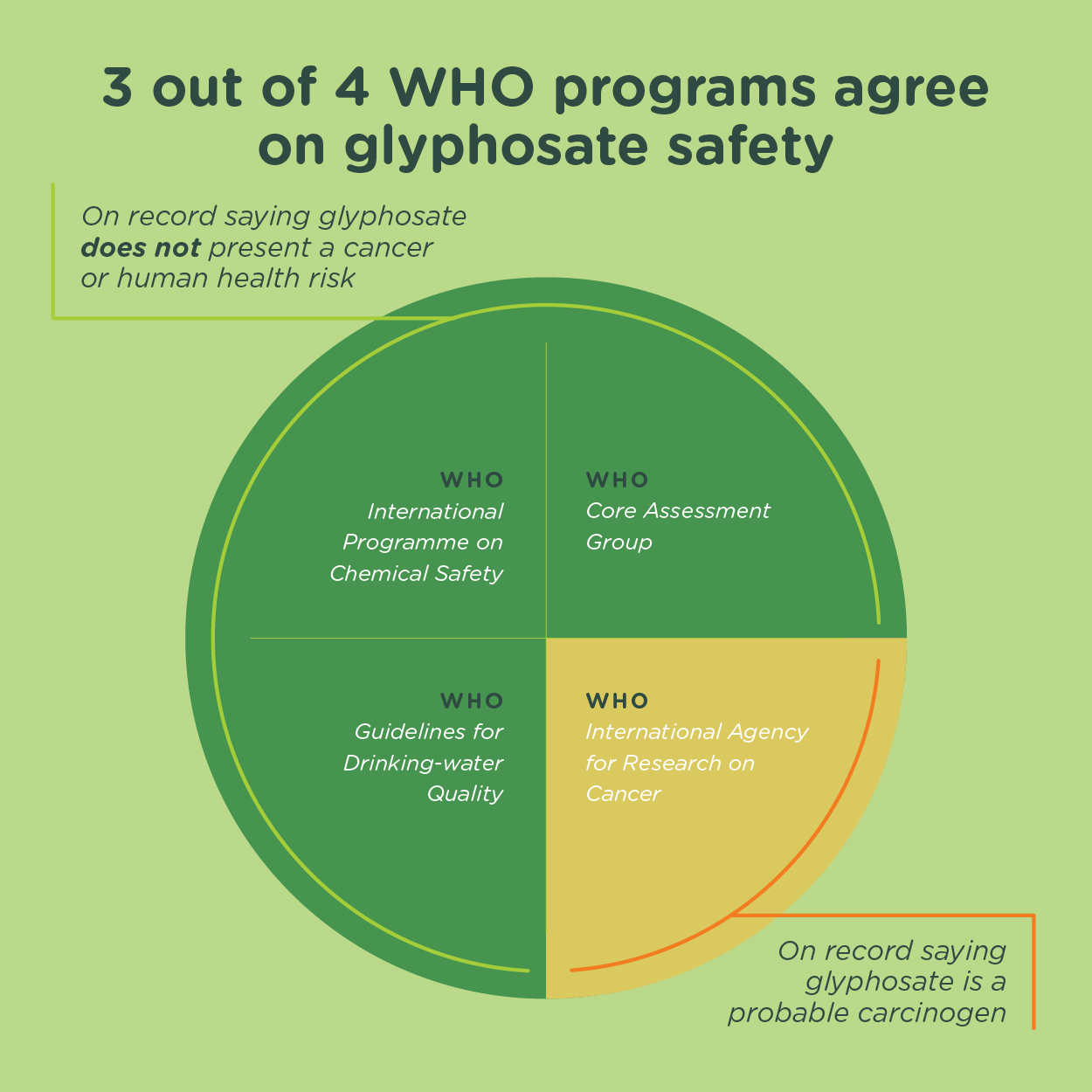Statements | April 21, 2017 | Read Time: 4 minutes
IARC's Report on Glyphosate
Glyphosate is a vital tool for sustainable agriculture. For example, glyphosate has helped farmers adopt conservation tillage. With conservation tillage, farmers can disturb less soil and drive their tractors less. As a result, farmers can reduce soil erosion and carbon emissions.
Glyphosate has a more than 40-year history of safe use. Over those four decades, there have been more than 800 scientific studies and reviews that prove glyphosate is safe for use. The National Institutes of Health (NIH) and the Joint FAO/WHO Meeting on Pesticide Residues (JMPR) both recently reaffirmed glyphosate does not cause cancer. The U.S. Environmental Protection Agency (EPA) and other regulatory authorities in Europe, Canada, Japan, Australia, Korea, and elsewhere routinely review all approved pesticide products and have consistently reaffirmed that glyphosate does not cause cancer.
In March 2015, a group called IARC incorrectly classified glyphosate as a “probable carcinogen.” IARC is the same organization that determined beer, meat, cell phones, and coffee cause cancer. IARC is not a regulatory authority and did no independent studies. IARC is one of four programs within the World Health Organization (WHO) that has reviewed glyphosate, and the only one to have made such a finding.
Investigative reports by Reuters (here and here) and the Times of London (here) have uncovered that IARC members reviewing glyphosate concealed important scientific data, edited out the conclusions of key studies, and were closely aligned with U.S. trial lawyers.
IARC is an Outlier
IARC’s classification is inconsistent with the overwhelming consensus of regulatory authorities and other experts around the world, who have assessed all the studies examined by IARC – and many more. While IARC’s erroneous classification has attracted media attention and been used repeatedly by certain anti-agriculture organizations to generate unwarranted fear and confusion, regulators around the world continue to support the safe use of glyphosate. Following are regulatory and other expert conclusions on glyphosate that have been announced in just the short time since IARC inappropriately classified glyphosate.


United States Environmental Protection Agency (EPA)
December 2017
“The draft human health risk assessment concludes that glyphosate is not likely to be carcinogenic to humans.”
Canadian Pest Management Regulatory Agency (PMRA)
April 2016
"Glyphosate is not genotoxic and is unlikely to pose a human cancer risk."
European Chemical Agency (ECHA) Committee for Risk Assessment (RAC)
March 2017
“RAC concluded that the available scientific evidence did not meet the criteria to classify glyphosate as a carcinogen, as a mutagen or as toxic for reproduction.”
Korean Rural Development Administration (RDA)
March 2017
“Moreover, it was concluded that animal testing found no carcinogenic association and health risk of glyphosate on farmers was low. … A large-scale of epidemiological studies on glyphosate similarly found no cancer link.”
Australian Pesticides and Veterinary Medicines Authority (APVMA)
October 2016
“Glyphosate does not pose a cancer to humans when used in accordance with the label instructions”
Expert Panels on Glyphosate – Peer Reviewed in Critical Reviews of Toxicology
September 2016
“The data do not support IARC’s conclusion that glyphosate is a “probable human carcinogen” and, consistent with previous regulatory assessments, further concluded that glyphosate is unlikely to pose a carcinogenic risk to humans”
United States Environmental Protection Agency (EPA)
September 2016
Glyphosate is classified as “not likely to be carcinogenic to humans”
New Zealand Environmental Protection Authority
August 2016
“Glyphosate is unlikely to be genotoxic or carcinogenic”
German Federal Institute for Occupational Safety and Health
May 2016
“No hazard classification for carcinogenicity is warranted for glyphosate according to the CLP criteria”
Joint FAO/WHO Meeting on Pesticide Residues (JMPR)
May 2016
“Glyphosate is unlikely to pose a carcinogenic risk to humans from exposure through the diet”
Japan Food Safety Commission (FSC)
March 2016
“No neurotoxicity, carcinogenicity, reproductive effect, teratogenicity or genotoxicity was observed”
European Food Safety Authority (EFSA)
November 2015
Glyphosate is not classified or proposed to be classified as carcinogenic or toxic for Reproduction class 2
United States Environmental Protection Agency (EPA)
October 2015
Glyphosate is classified as “Not Likely to be Carcinogenic to Humans”
Canadian Pest Management Regulatory Agency (PMRA)
April 2015
“The overall weight of evidence indicates that glyphosate is unlikely to pose a human cancer risk”









